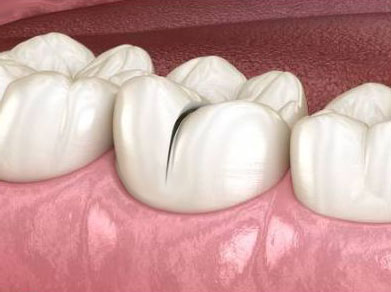
Cracking a tooth can happen for a number of reasons, but whatever the cause, it can result in the development of various dental problems.
An accident or injury to your mouth is the most common cause of a cracked or fractured tooth, in spite of the relative strength of teeth. If you bite down on something hard, for example, the pressure may be more than the tooth structure can stand.
Getting hit in the face or mouth during a fall, playing sports or a car accident are also some of the reasons for tooth fracture that we see most often.
Less common causes, but ones we still see plenty of, is when a patient has an untreated cavity that weakens the tooth, or large, old amalgam fillings that no longer support the tooth enamel sufficiently well.
A tooth fracture doesn’t always cause pain. When a piece of the enamel cracks or breaks off, which often happens around a filling, it’s called a fractured cusp. Unless this causes damage to the tooth pulp, you won’t feel pain right away. As with a tooth crack caused by injury or wear and tear, however, you’ll feel pain or a weird sensation when your tooth comes into contact with heat or cold. Alternatively, a cracked tooth might begin aching when you chew your food with it. In most instances, the pain comes and goes, and it can be difficult to identify which tooth is causing the problem.
If you suspect you have a cracked tooth, or you experience any of the signs mentioned above, visit your dentist as soon as possible. Early treatment is the best way to avoid complications like an oral infection arising from bacteria getting stuck in the vulnerable tooth. If you need specialized care, the dentist may refer you to an endodontist instead, or he will recommend treatment for the particular type, location and severity of the crack. While you wait for an appointment, it’s important to avoid chewing on the side of your mouth where the pain exists, because biting can open the crack and irritate the tooth pulp nerves and blood vessels.
Minor cracks that only affect the outer layer of a tooth might not need treatment, but your dentist will likely polish the tooth to improve its appearance. For a tooth crack that causes damage to the enamel, a good solution is to repair the tooth with filling material and then cover and protect it with a crown. If the crack reaches through into the tooth tissue, you may need a root canal treatment to remove damaged tooth pulp. While this is a more invasive procedure, it can help save your tooth if the fracture has damaged it a lot. The worse-case scenario, if the crack infiltrates onto the root of the tooth (where a repair is not possible), extraction of the tooth may be needed and subsequent replacement can be discussed with your dentist.
For more information on treatment for a cracked or fractured tooth, please book an appointment with our dentist in Scarborough at 416-267-4661, or click here to book online.
Do you ever feel nervous about dentist appointments? Rest assured: we cater to nervous and anxious patients in a gentle and considerate manner. Call us now to schedule a free consultation!